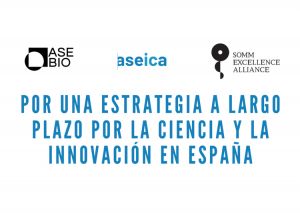The signatories consider this is a crucial moment of putting R&D at the centre of Spain’s future strategy for a sustainable and resilient recovery. It is a unique window of opportunity presented by yesterday’s preliminary draft of the state’s new general budget, the European Reconstruction Plan, the "Green Deal" and the missions of the new Horizon Europe Framework Program of the European Union.
Furthermore, the public has been able to grasp the need to have a solid research capacity for the challenges we are currently facing. Despite this, Spain invests just 1.24% of its GDP in R&D, a figure much lower than the EU average (2.12%), and far from countries such as Germany, Denmark or Austria (around 3%).
The call for action proposes a broad range of administrative and legal recommendations, as well as the implementation of strategic actions so that science and innovation act as the engines for the recovery of the country. The transformation of the economic model would counterbalance the dependence of sectors heavily affected by the current pandemic, giving Spain new opportunities and a stronger position for the future. Crystallizing the great Spanish potential in R&D would lay the foundations for a solid recovery through a sustainable, competitive economic model based on providing high added value.
“The current context has abruptly exposed the shortcomings of our economic model. Spain is thought to be one of the advanced economies most affected by the pandemic, making it essential to change the foundations of our economic model before we can regrow. This is a turning point which we cannot back away from, as it is only through a new economic model that we can ensure the future of Spain. Taking urgent action through the state’s general budget is just the starting point. A state pact for R&D is necessary now more than ever." Luis Serrano, president of SOMMa and director of the Centre for Genomic Regulation.
“Covid-19 has revealed what we have been warning for a long time: the urgent need to invest in science and innovation to ensure the health of our citizens and to develop an economy based on knowledge, not entertainment. We must take the bull by the horns: we need stable long-term plans and short-term solutions to meet these challenges. Let's say it once again: research is not a luxury, it is the only way we have to ensure the health and quality of life of our fellow citizens. And this does not depend on ideologies, it is a project that cuts across all divides”. Xosé Bustelo, President of ASEICA.
“This appeal to our political representatives, to the administration and to society itself, is nothing but a joint demand for a long-term strategy that promotes science and innovation in our country and places them at the heart of its strategy. Innovative companies and entities are committed to this effort if we have an adequate and stable framework that allows us to work collaboratively with the rest of the agents of the R & D & I ecosystem and thus contribute to the transformation of our production model. " Ion Arocena, CEO of AseBio.
The appeal led by SOMMa, ASEICA and AseBio centres around three groups of measures, the first of which focuses on the strengthening of basic and translational frontier science. The signatories demand a simplification of expense management and associated bureaucracy, an increase and optimization of investment, new talent recruitment programs, and mechanisms that favour the stability of research projects promoted by public organizations.
The second tier of recommendations propose measures that strengthen innovation and promote the transition to a sustainable economy with high added value. It is proposed to promote public-private cooperation and innovative business fabric, as well as the creation of a patronage-fundraising law. It also calls for a need to undertake a profound reform of the aid model for business R&D and a legal framework that minimizes uncertainties and provides stability and security to the R&D system.
Finally, the third tier of recommendations call for new mechanisms to increase synergies between the academic and business sectors. Key to this will be the development of a long-term national strategy that includes the autonomous communities, increasing the capacity to transfer the knowledge of universities and research institutes into innovative solutions and the creation of new technology-based companies. Finally, the signatories appeal to cultivate the value of science as a reference for citizenship, the business community and political action.






